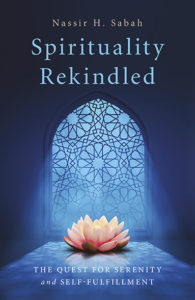(Original article: Mystic Living Today, November 2023)
Nassir H. Sabah
Many people decline to believe in God because they find the mental image that they have of God disturbing and hard to accept. They may have acquired this image early in life through their parents or clerics, or through some reading, or simply in conformity with what is generally accepted by their peers. They might think of God as a bearded, sullen old man somewhere high up in the sky surrounded by cherubic angels. Or they may believe that God is some being who created the heavens and Earth in six weekdays, resting on the seventh, and then retired, letting “nature” take care of itself. A more sophisticated view is of God as some abstract notion such as “higher intelligence” or “universal consciousness”, whatever such terms mean.
It should be recognized at the outset that the nature of God is beyond human comprehension and imagination. All attempts in this regard are futile and should be abandoned. How are we then to think about God? Only in terms of His manifestations and attributes.
The famous Light Verse of the Quran begins with: “God is the light of the heavens and earth…” The interpretation of this statement focusses on two main characteristics of light: (i) it is visible by itself, as in the case of a beam of light streaming into a dark room, and (ii) it makes everything else visible. God is thus the most evident reality in Himself and also through whom everything else in the heavens and Earth is known. This knowledge derives from His having created the heavens and Earth and from His guidance and sustenance of all that is in them through the laws of nature that He ordained. Nature and its laws are manifestations of God. Everything in the universe is governed by the laws of nature, which are part of God’s will.
According to the Quran and the Islamic tradition, God has 99 main attributes, referred to as “The Most Exalted Names”. The most consequential of these attributes is God’s “rahmah”. Although this Arabic word is usually translated as mercy, it has a broader meaning that combines mercy with love and connotes being kind, gracious, gentle, forgiving, compassionate, and benevolent through charitable acts. It is more like “loving-mercy”, or “love-in-action”. If love is the spring of goodness and beauty, “rahmah” is what makes the spring gush forth and sprout life along its way.
God is transcendent, omnipotent, omniscient, not bound by space or time, the real owner of everything in the universe, the willer of all things that are, the doer of whatever He wills, the most compassionate, the ever-merciful, the all-forgiving, the ever-forgiving, the relenting, the responsive, the all-loving, the all-wise, the all-just, and much more. God is maximally perfect in every way. When one contemplates God’s manifestations and attributes, one cannot but feel deep humility, considering His indescribable greatness, majesty, and glory. The question that almost inevitably arises, “Why Does God Allow Suffering and Evil?” is addressed in the article of the same title in Mystic Living Today, September 2023.
